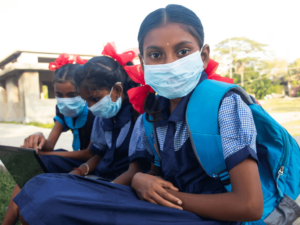Winter is here! When you hear this, we all start picturing chilly winters, bonfires, snowing and many evenings spent indoors with our friends and families all cozied up. But what we don’t remember is the evenings spent coughing, sneezing, running a fever, our body’s swinging from hot to cold because of the FLU.
What is the flu?
The flu is short for the influenza virus and it is a respiratory illness. It is more often than not confused with the common cold as they have many common symptoms. But the flu also has certain additional symptoms such as body ache, headaches, gastrointestinal discomfort; vomiting, diarrhoea etc. The flu is highly contagious. Contrary to popular belief, it is NOT caused by the cooler temperatures prevailing in winter. But cooler temperatures are certainly a contributing factor in the extent of their spread. As winters approach and temperatures start to drop the virus attacks. The number of flu cases increase significantly. Now you’re probably wondering why that is?
Let’s see, shall we?
Why is flu more common in the winter?
The flu is more common in the winters for many reasons:
- The causative virus is much more resilient and stronger in the winters than in the summers. The virus is able to invade our bodies much better in the winters. Its multiplication rates are high as well.
- The virus is easily spread indoors as the amount of time we spend indoors increases. So, you’re more likely to come in contact with a person who has the flu.
- As the nights get longer, the Vitamin D and melatonin levels in the body fall as they both require sunlight for their production. This leads to weakening of the immune systems making you more vulnerable to the flu.
Now that you know why the flu spreads let’s see all you can do to prevent its spread.
How to prevent the flu from spreading?
- Reduce contact with people who have the flu and limit contact with others if you are sick.
- Always use a tissue while coughing or sneezing to prevent the infection from spreading.
- Always wash your hands with antiseptic soap and water. Alcohol based sanitizers are also recommended.
- Disinfect all the surfaces with a surface disinfectant to prevent the multiplication of the viruses.
- Avoid constantly touching your eyes, nose and mouth as the germs can get into your body easily this way.
- Try to stay at home for at least 24 hours after your fever has gone down.
- Always complete the course of anti-viral medication prescribed to you by the doctor.
- Get the yearly flu shot.
Now, it may happen that despite all the preventive measures taken by you, you may still get the flu. Here’s what should you do.
Treatment of flu
If you do get the flu here’s all you should do to treat the symptoms:
- Very important to remember to take rest. This will allow your immune system to recover faster and fight the infection.
- Always consume plenty of fluids like water, juice, soup, etc. to remain hydrated. This aids in a faster recovery.
- You can use over-the-counter pain medications to relieve the body ache and headache that usually accompanies the flu. Teenagers and kids should not take Aspirin to prevent Reyes syndrome which is a rare, but fatal condition.
Usually, the flu is easily prevented and treated with very simple measures. But should the symptoms persist it can be indicative of a serious underlying condition. It is advisable to consult a doctor and get the COVID-19 test as well.
Speak to our expert professionals if you need professional assistance in this regard. Visit our blogs and community forum for more health tips and updates.
Stay Connected, Stay Informed!!!
#flu #cough #cold #winter #influenza #covid19 #sneezing #coughing #medicine #medical #fluids #hydrate #water #doctors #doctorconsultation #clinqon_india #medications #respiration #illness #lungs #virus #commoncold #fever










































































